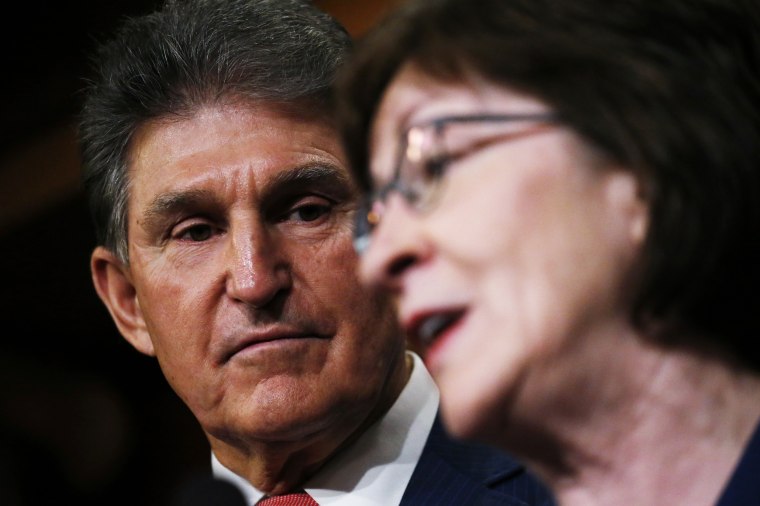WASHINGTON — The survival of the Senate's effective supermajority rule to pass bills could hinge on a working group of 20 senators that includes the most moderate members in both parties.
If the group can cut deals and deliver victories, it could become the model for lawmaking under President Joe Biden. If it fails, the Democratic-led Congress will face pressure to pursue partisan avenues to enact its ambitious agenda, including the simple-majority budget process and nixing the filibuster.
The group, evenly divided between the two parties, is off to a rough start. It was sidelined for the $1.9 trillion Covid-19 relief package. It is ill-defined and lacks a clear focus or method. It has yet to show signs of success in the new presidency.
Its ability to prove that the Senate can function under the 60-vote requirement carries high stakes for the future of the chamber — and for politics and policymaking over the next four years.
"The argument against the filibuster is that nothing happens and it's all obstruction. And if we can make it work, we can get legislation passed without changing the rules," said Sen. Angus King of Maine, an independent who caucuses with Democrats and has worked across the aisle.
Republican members of the group say they want to defuse the push to ax the filibuster.
"That's certainly our goal: to diminish the hue and cry by the left for elimination of the 60-vote rule," said Sen. Jerry Moran of Kansas. "To say, no, there are ways in which we can work together, that the Senate can function, and needs to."
Sen. Todd Young of Indiana, another GOP member of the group, agreed.
"I do think that group will be the group that decides whether or not we can maintain the 60-vote threshold," Young said. "I don't see any reason for me to continue to participate in the group if some of the members significantly erode the filibuster, or decide to effectively abandon it altogether."
The group will serve as a critical test of Sen. Joe Manchin's theory that the filibuster should be preserved because it promotes cooperation. The West Virginian is the most outspoken Democratic supporter of the 60-vote threshold, and without him the party lacks the votes to modify it.
"Let's start talking to each other — not talking over each other or through each other as senators. We're talking as individuals with each other," Manchin told NBC News on Tuesday, when asked about the role of the group. "Good commonsense people should find common ground."
The two issues that have generated the most optimism about bipartisanship lately are an infrastructure package and legislation to enhance U.S. competitiveness with China.
The group of 20 was scheduled to meet on Wednesday, senators said, as Congress grapples with a host of contentious issues including a hike in the minimum wage, gun violence, immigration and the migrant influx at the border, and voting rights. But that meeting didn't materialize, according to two sources with knowledge of the situation.
"We'll continue to play a role on a lot of important issues," Sen. Susan Collins, R-Maine, one of the leaders of the group, said Tuesday.
Collins spoke to White House chief of staff Ron Klain last Friday, a conversation that her spokeswoman Annie Clark described as "constructive."
The two got off to a rough start this year. Collins, one of the most moderate Republicans, publicly blamed Klain in part for the decision to sideline her party on Covid-19 relief. Privately, her team was irked by his decision to retweet some criticism of the senator on social media.
Sen. Mitt Romney, R-Utah, said the bipartisan senators will discuss "the president's infrastructure plans and what we might come up with as a group."
The bipartisan group's meeting comes amid growing Democratic frustration with the filibuster. Senate Majority Whip Dick Durbin, D-Ill., last week came out swinging against the 60-vote rule and called it a danger to democracy. Sen. Dianne Feinstein, D-Calif., an institutionalist, said she's "open to changing the way the Senate filibuster rules are used" if Republicans "abuse" the tool.
Biden supported the filibuster in his 36 years in the Senate, but he has also changed his position. Last week he called for changing the rule to a "talking filibuster," which places a greater onus on members of the minority party by forcing them to hold the floor and talk to block legislation.
The White House is shifting its messaging, with communications director Kate Bedingfield telling MSNBC that Biden is "open to a discussion" about changing Senate rules. She said he wants to work with Republicans to achieve cross-party consensus but is not willing to "allow progress and to allow benefits to the American people to be held hostage in the process."
Sen. Mike Rounds, R-S.D., said the success of the group will depend more on "whether or not the administration wants it to work."
He said the White House should play a greater role and offer "a declaration of what they would like to see, and open it up for a discussion on the subject matter," citing infrastructure as ripe for cooperation as long it is limited to consensus matters like roads and bridges, while excluding contentious items.
Days before Biden took office, a Pew Research Center poll found that self-identified Republicans, by a 21-point margin, preferred that party leaders stand up to Biden even if that makes it harder to address problems in the country, as opposed to trying to compromise with him to accomplish things.
Rounds said Democrats' moves to use reconciliation have upset Republicans — even though the GOP used the same tool to pass a tax law on a partisan basis in 2017.
"The impact is that Republicans look and say, 'Well, if you're going to do it yourself, then you don't need us, so why would we help you? Why would we make it easier for you?'" Rounds said.

